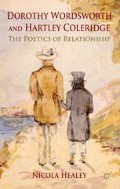Abstract
Hartley’s relationship with his father forced him to scrutinize the value of name, fame and posterity. His relationship with his metaphoric father, William Wordsworth, drove him to explore these themes further in his life-long attempt to demarcate his own literary identity, and thereby reach a greater understanding of the role of the poet in general. Hartley uses William in particular to criticize the egotistical tendencies of a poet: his attack on William’s poetic ‘ownership’ of the celandine — ‘The Celandine one mighty bard may prize; / The Daisy no bard can monopolise’ (CPW, p. 165, ll. 13–14) — forms part of Hartley’s larger discourse on the necessary humility of the poet’s vocation.
Access this chapter
Tax calculation will be finalised at checkout
Purchases are for personal use only
Preview
Unable to display preview. Download preview PDF.
Copyright information
© 2012 Nicola Healey
About this chapter
Cite this chapter
Healey, N. (2012). ‘Who is the Poet?’: Hartley Coleridge, William Wordsworth and the ‘The Use of a Poet’. In: Dorothy Wordsworth and Hartley Coleridge. Palgrave Macmillan, London. https://doi.org/10.1057/9780230391796_4
Download citation
DOI: https://doi.org/10.1057/9780230391796_4
Publisher Name: Palgrave Macmillan, London
Print ISBN: 978-1-349-32563-4
Online ISBN: 978-0-230-39179-6
eBook Packages: Palgrave Literature CollectionLiterature, Cultural and Media Studies (R0)

